人教版八年级上册Unit 8How do you make a banana milk shake? Section A词汇讲解课件(共20张PPT)
文档属性
| 名称 | 人教版八年级上册Unit 8How do you make a banana milk shake? Section A词汇讲解课件(共20张PPT) | 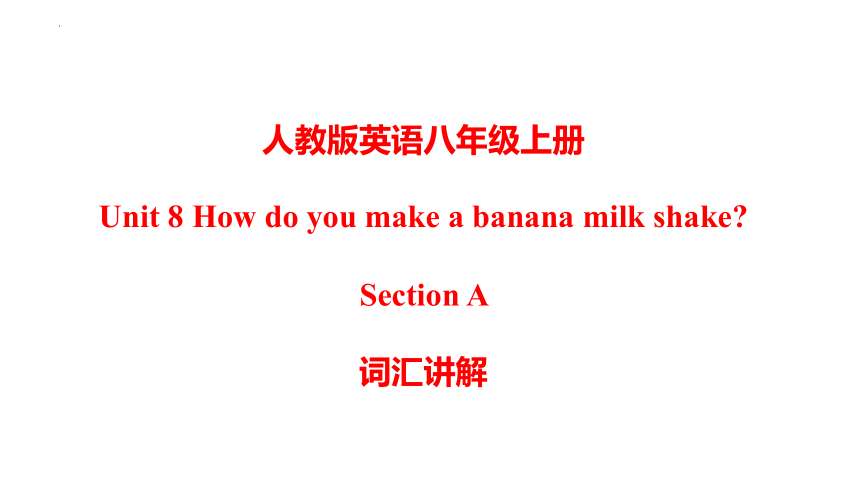 | |
| 格式 | pptx | ||
| 文件大小 | 88.4KB | ||
| 资源类型 | 教案 | ||
| 版本资源 | 人教新目标(Go for it)版 | ||
| 科目 | 英语 | ||
| 更新时间 | 2022-10-05 10:40:33 | ||
图片预览

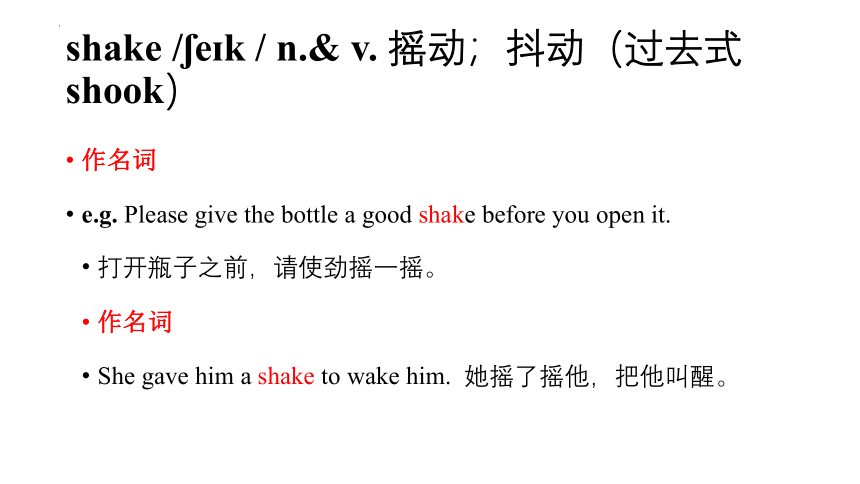
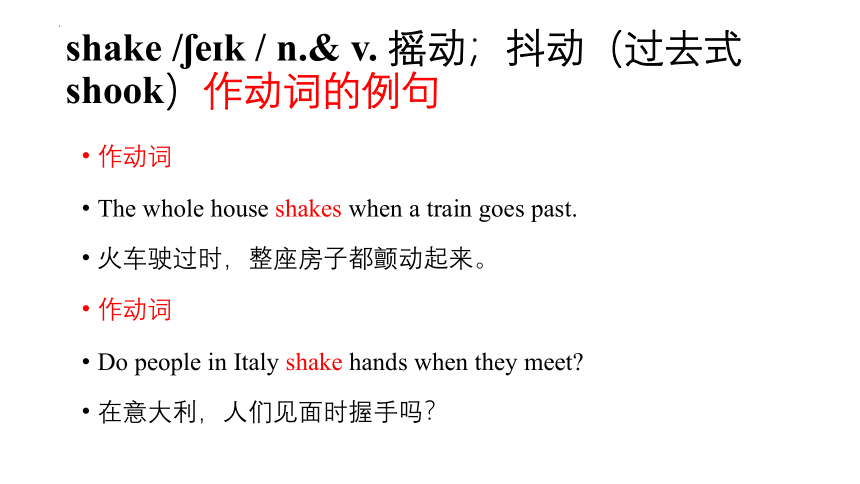
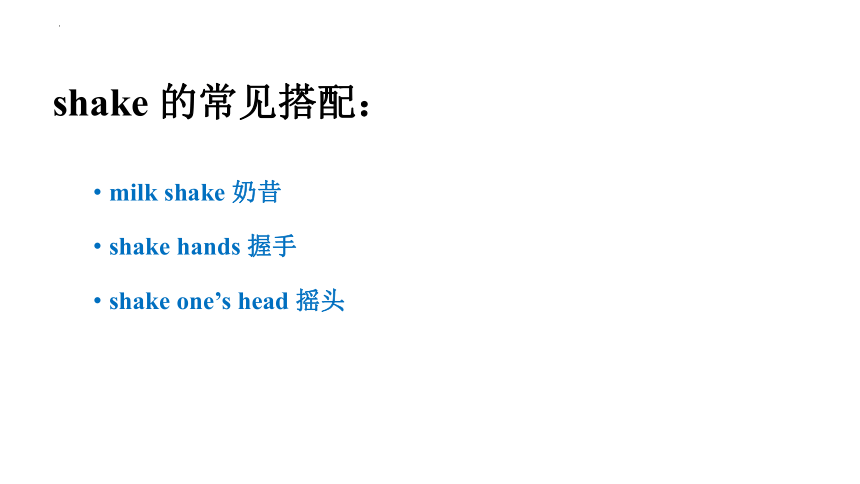
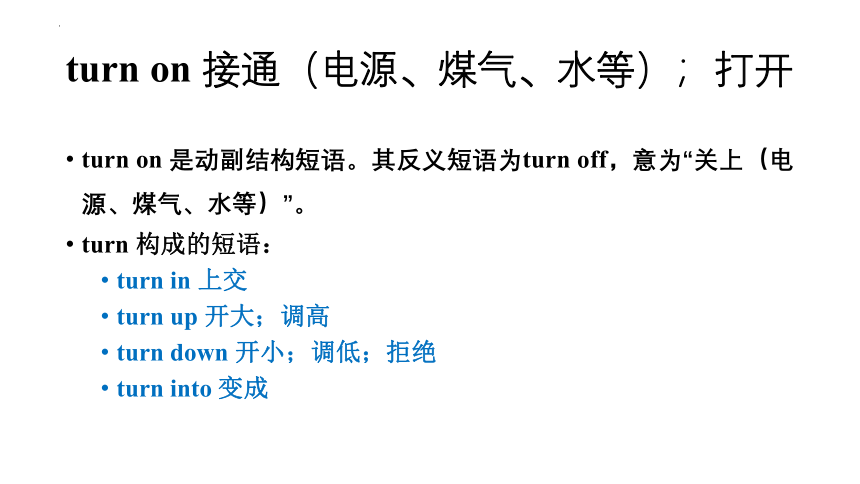
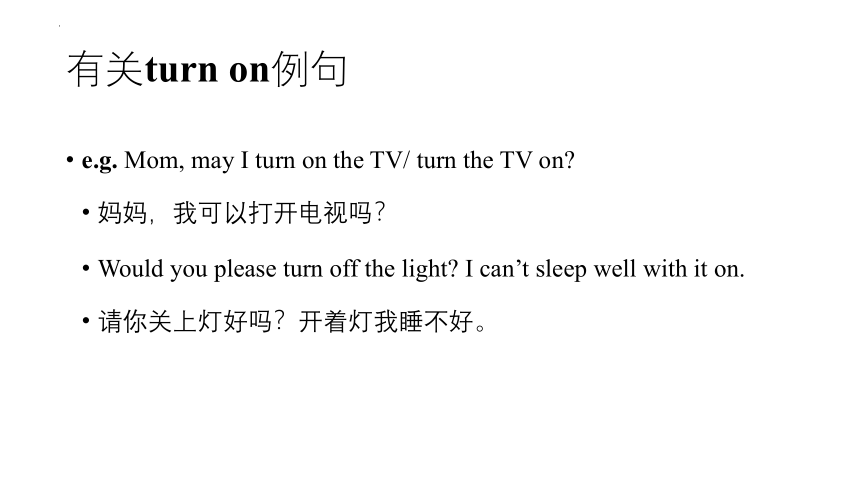
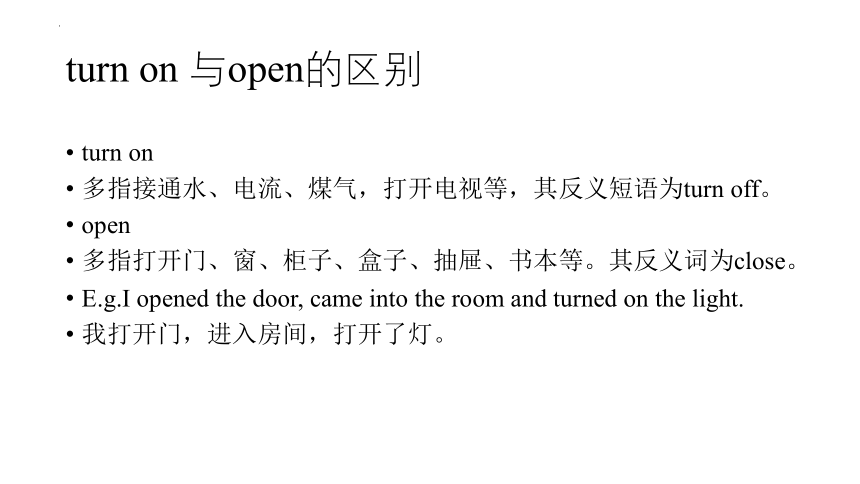
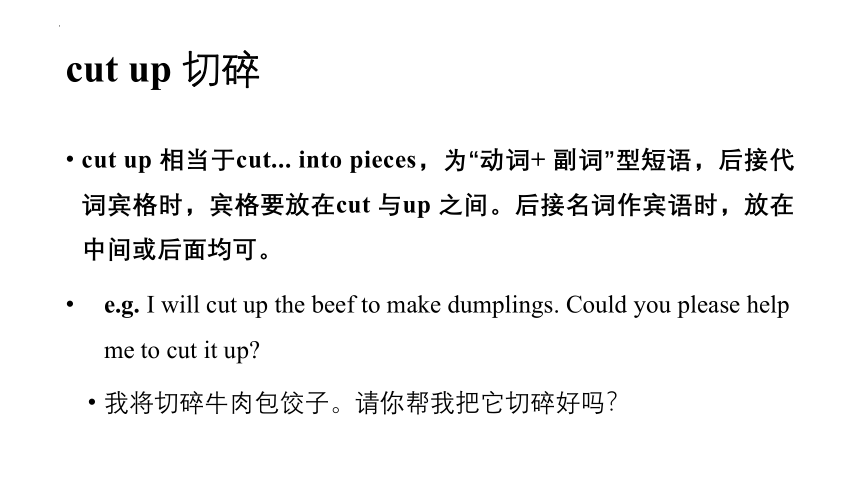
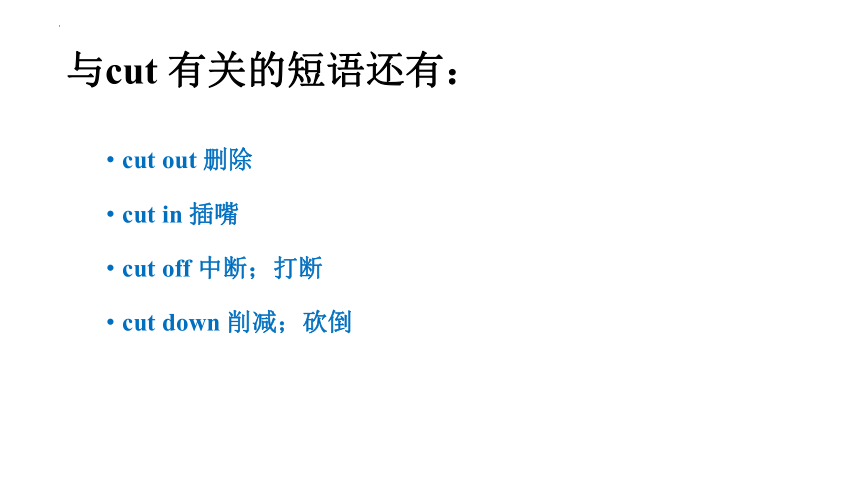
文档简介
(共20张PPT)
人教版英语八年级上册
Unit 8 How do you make a banana milk shake
Section A
词汇讲解
shake / e k / n.& v. 摇动;抖动(过去式shook)
作名词
e.g. Please give the bottle a good shake before you open it.
打开瓶子之前,请使劲摇一摇。
作名词
She gave him a shake to wake him. 她摇了摇他,把他叫醒。
shake / e k / n.& v. 摇动;抖动(过去式shook)作动词的例句
作动词
The whole house shakes when a train goes past.
火车驶过时,整座房子都颤动起来。
作动词
Do people in Italy shake hands when they meet
在意大利,人们见面时握手吗?
shake 的常见搭配:
milk shake 奶昔
shake hands 握手
shake one’s head 摇头
turn on 接通(电源、煤气、水等);打开
turn on 是动副结构短语。其反义短语为turn off,意为“关上(电源、煤气、水等)”。
turn 构成的短语:
turn in 上交
turn up 开大;调高
turn down 开小;调低;拒绝
turn into 变成
有关turn on例句
e.g. Mom, may I turn on the TV/ turn the TV on
妈妈,我可以打开电视吗?
Would you please turn off the light I can’t sleep well with it on.
请你关上灯好吗?开着灯我睡不好。
turn on 与open的区别
turn on
多指接通水、电流、煤气,打开电视等,其反义短语为turn off。
open
多指打开门、窗、柜子、盒子、抽屉、书本等。其反义词为close。
E.g.I opened the door, came into the room and turned on the light.
我打开门,进入房间,打开了灯。
cut up 切碎
cut up 相当于cut... into pieces,为“动词+ 副词”型短语,后接代词宾格时,宾格要放在cut 与up 之间。后接名词作宾语时,放在中间或后面均可。
e.g. I will cut up the beef to make dumplings. Could you please help me to cut it up
我将切碎牛肉包饺子。请你帮我把它切碎好吗?
与cut 有关的短语还有:
cut out 删除
cut in 插嘴
cut off 中断;打断
cut down 削减;砍倒
pour /p (r) / v. 倒出;倾倒
(1)pour... into... 把……倒进……里
e.g. Stop pouring the dirty water into the rivers or lakes nearby. 停止向附近的河里或湖里倾倒污水。
(2)pour... out 把……倒出
e.g. Please pour the cold water out. 请把冷水倒出来。
pour /p (r) / v. 倒出;倾倒
(3)pour sth. for sb.= pour sb. sth.给某人倒某物
e.g. Can you pour me some tea, please = Can you pour some tea for me, please 请给我倒点茶好吗?
pour 作动词,还有“(雨)倾盆而下”之意。
e.g. It’s pouring outside. 外面下着瓢泼大雨。
yogurt /'j ɡ t/ n. 酸奶
yogurt 作不可数名词,若表示它的量,常借助表示计量单位的词。
e.g. I’d like two cups of yogurt. 我想要两杯酸奶。
常见的其他与食物有关的不可数名词还有:
honey 蜂蜜 salt 食盐 sugar 糖
cheese 干酪;奶酪 popcorn 爆米花
corn 玉米 butter 黄油;奶油
add / d/ v. 增加;添加
add 常见用法:
① add to 使(数量)增加;使(规模)扩大
② add… to…把…… 添加到……
③ add up to 总共是; 总计为
add的例句及拓展
e.g. The bad weather added to our difficulties.
恶劣的天气增加了我们的困难。
Are you looking for something that can add colour to your summer holiday 你在寻找能给你的暑假增添色彩的事情吗?
add的例句及拓展
We emptied our pockets, and all our money added up to $3.28. 我们掏空了口袋,所有的钱总共是3.28 美元。
拓展:add 还有“补充道”之意。
e.g. “Please be careful,” my mother added. “请小心,” 我妈妈补充道。
finally /'fa n li/ adv. 最后;最终
e.g. He finally passed the test. 他最终通过了考试。
finally 相当于in the end 或at last,表示顺序。
可位于句首或句中, 位于句中时位于be动词、助动词
或情态动词之后,行为动词之前。
finally, at last 与in the end的区别
finally
表示先后顺序中的“最后”,侧重结果,一般不带感彩。
at last
意为“最后;终于”,在语义上指经过周折、等待或耽搁后,终于得到了期待的结果,感彩浓厚。
in the end
意为“最后;终于”,用来表示时间上的“最后”;它还可以用在将来时中,而at last 和finally 无此用法。
finally, at last 与in the end实例区别理解
e.g. And finally, I would like to thank you all for coming here today. 最后,我想感谢你们所有人今天的光临。
He studied hard, and passed the exam at last.
他努力学习,最后通过了考试。
The customer was happy in the end.
最后那位顾客高兴了。
salt /s lt / n. 食盐
salt 为不可数名词。
e.g. Please pass me some salt. 请递给我一些盐。
The soup is a little salty. 汤有点咸。
拓展:salt 作名词,其对应的形容词为salty,意为“咸的;含盐的”。
谢谢观看
Thank you for watching!
人教版英语八年级上册
Unit 8 How do you make a banana milk shake
Section A
词汇讲解
shake / e k / n.& v. 摇动;抖动(过去式shook)
作名词
e.g. Please give the bottle a good shake before you open it.
打开瓶子之前,请使劲摇一摇。
作名词
She gave him a shake to wake him. 她摇了摇他,把他叫醒。
shake / e k / n.& v. 摇动;抖动(过去式shook)作动词的例句
作动词
The whole house shakes when a train goes past.
火车驶过时,整座房子都颤动起来。
作动词
Do people in Italy shake hands when they meet
在意大利,人们见面时握手吗?
shake 的常见搭配:
milk shake 奶昔
shake hands 握手
shake one’s head 摇头
turn on 接通(电源、煤气、水等);打开
turn on 是动副结构短语。其反义短语为turn off,意为“关上(电源、煤气、水等)”。
turn 构成的短语:
turn in 上交
turn up 开大;调高
turn down 开小;调低;拒绝
turn into 变成
有关turn on例句
e.g. Mom, may I turn on the TV/ turn the TV on
妈妈,我可以打开电视吗?
Would you please turn off the light I can’t sleep well with it on.
请你关上灯好吗?开着灯我睡不好。
turn on 与open的区别
turn on
多指接通水、电流、煤气,打开电视等,其反义短语为turn off。
open
多指打开门、窗、柜子、盒子、抽屉、书本等。其反义词为close。
E.g.I opened the door, came into the room and turned on the light.
我打开门,进入房间,打开了灯。
cut up 切碎
cut up 相当于cut... into pieces,为“动词+ 副词”型短语,后接代词宾格时,宾格要放在cut 与up 之间。后接名词作宾语时,放在中间或后面均可。
e.g. I will cut up the beef to make dumplings. Could you please help me to cut it up
我将切碎牛肉包饺子。请你帮我把它切碎好吗?
与cut 有关的短语还有:
cut out 删除
cut in 插嘴
cut off 中断;打断
cut down 削减;砍倒
pour /p (r) / v. 倒出;倾倒
(1)pour... into... 把……倒进……里
e.g. Stop pouring the dirty water into the rivers or lakes nearby. 停止向附近的河里或湖里倾倒污水。
(2)pour... out 把……倒出
e.g. Please pour the cold water out. 请把冷水倒出来。
pour /p (r) / v. 倒出;倾倒
(3)pour sth. for sb.= pour sb. sth.给某人倒某物
e.g. Can you pour me some tea, please = Can you pour some tea for me, please 请给我倒点茶好吗?
pour 作动词,还有“(雨)倾盆而下”之意。
e.g. It’s pouring outside. 外面下着瓢泼大雨。
yogurt /'j ɡ t/ n. 酸奶
yogurt 作不可数名词,若表示它的量,常借助表示计量单位的词。
e.g. I’d like two cups of yogurt. 我想要两杯酸奶。
常见的其他与食物有关的不可数名词还有:
honey 蜂蜜 salt 食盐 sugar 糖
cheese 干酪;奶酪 popcorn 爆米花
corn 玉米 butter 黄油;奶油
add / d/ v. 增加;添加
add 常见用法:
① add to 使(数量)增加;使(规模)扩大
② add… to…把…… 添加到……
③ add up to 总共是; 总计为
add的例句及拓展
e.g. The bad weather added to our difficulties.
恶劣的天气增加了我们的困难。
Are you looking for something that can add colour to your summer holiday 你在寻找能给你的暑假增添色彩的事情吗?
add的例句及拓展
We emptied our pockets, and all our money added up to $3.28. 我们掏空了口袋,所有的钱总共是3.28 美元。
拓展:add 还有“补充道”之意。
e.g. “Please be careful,” my mother added. “请小心,” 我妈妈补充道。
finally /'fa n li/ adv. 最后;最终
e.g. He finally passed the test. 他最终通过了考试。
finally 相当于in the end 或at last,表示顺序。
可位于句首或句中, 位于句中时位于be动词、助动词
或情态动词之后,行为动词之前。
finally, at last 与in the end的区别
finally
表示先后顺序中的“最后”,侧重结果,一般不带感彩。
at last
意为“最后;终于”,在语义上指经过周折、等待或耽搁后,终于得到了期待的结果,感彩浓厚。
in the end
意为“最后;终于”,用来表示时间上的“最后”;它还可以用在将来时中,而at last 和finally 无此用法。
finally, at last 与in the end实例区别理解
e.g. And finally, I would like to thank you all for coming here today. 最后,我想感谢你们所有人今天的光临。
He studied hard, and passed the exam at last.
他努力学习,最后通过了考试。
The customer was happy in the end.
最后那位顾客高兴了。
salt /s lt / n. 食盐
salt 为不可数名词。
e.g. Please pass me some salt. 请递给我一些盐。
The soup is a little salty. 汤有点咸。
拓展:salt 作名词,其对应的形容词为salty,意为“咸的;含盐的”。
谢谢观看
Thank you for watching!
同课章节目录
- Unit 1 Where did you go on vacation?
- Section A
- Section B
- Unit 2 How often do you exercise?
- Section A
- Section B
- Unit 3 I'm more outgoing than my sister.
- Section A
- Section B
- Unit 4 What's the best movie theater?
- Section A
- Section B
- Unit 5 Do you want to watch a game show?
- Section A
- Section B
- Unit 6 I'm going to study computer science.
- Section A
- Section B
- Unit 7 Will people have robots?
- Section A
- Section B
- Unit 8 How do you make a banana milk shake?
- Section A
- Section B
- Unit 9 Can you come to my party?
- Section A
- Section B
- Unit 10 If you go to the party, you'll have a grea
- Section A
- Section B
